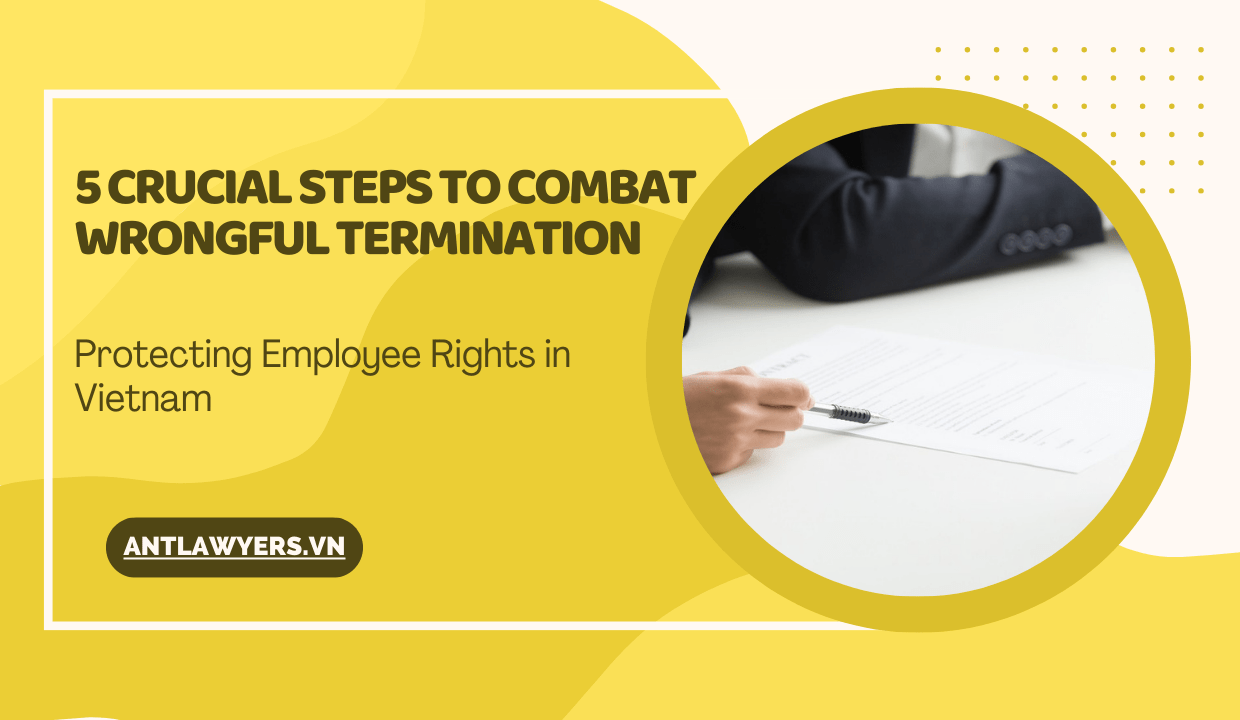Employment Termination in Vietnam: 5 Essential Steps


Introduction to Employment Termination in Vietnam
Navigating the complexities of employment termination in Vietnam can be challenging for both employers and employees. In Vietnam, where labor laws are specifically designed to protect workers’ rights while balancing employer interests, understanding the correct procedures for terminating an employment contract is vital.
In here, we delve into the legally compliant methods for employment termination in Vietnam, ensuring that all parties understand their rights and obligations.
Employment termination in Vietnam is a regulated process, governed by the Labor Code. This code outlines specific scenarios under which an employment contract may be legally terminated, ensuring protection and fairness for all parties involved. It’s crucial for both employers and employees to comprehend these rules to navigate the termination process effectively.
Understanding Legal Grounds for Employment Termination in Vietnam
The Labor Code specifies several grounds on which employment contracts can be terminated. These include the expiration of the contract term, completion of the work specified in the contract, mutual agreement, and other circumstances such as legal incapacity or death of either party involved. Additionally, legal directives, such as incarceration without probation or deportation of foreign workers, also mandate employment termination in Vietnam.
For employers, it is crucial to document and communicate the reasons for termination clearly and legally to avoid disputes that could lead to legal repercussions. For employees, understanding these grounds helps safeguard their rights and prepares them for potential legal actions in case of wrongful termination.
Mutual Agreement: A Collaborative Approach to Employment Termination in Vietnam
One of the simplest and most harmonious ways to handle employment termination in Vietnam is through mutual agreement. This method respects the initial contract terms and usually results in a more amicable separation. Both parties must consent to the termination, and it is advisable to document this agreement to prevent any future legal challenges.
Employers and employees are encouraged to discuss potential termination openly and negotiate terms that satisfy both parties, such as notice periods, severance pay, and transition plans for remaining responsibilities. This approach not only simplifies the termination process but also helps maintain professional relationships post-employment. If there could be potential disputes while discussing potential termination, each party could independently consult with employment lawyers in Vietnam for strength and weakness in their cases for proper strategy.
Unilateral Termination by Employees
Employees in Vietnam have the right to unilaterally terminate their employment contracts under specific conditions, as outlined in the Labor Code. These include not being assigned the agreed-upon tasks, delay or lack of payment, mistreatment by the employer, and several other significant factors that breach the terms of employment.
However, to execute this right, employees must adhere to stipulated notice periods, 45 days for indefinite contracts and 30 days for fixed contracts over one year.
In cases where the contract is less than a year, a notice of three days is required. Employers must be formally notified through written communication, ensuring that the process remains transparent and legally compliant.
Legal Repercussions of Improper Employment Termination in Vietnam
Improper employment termination in Vietnam can have serious consequences, particularly for the employee. If an employee terminates their contract without adhering to the legal requirements, they may forfeit their right to severance pay and could be liable for damages. Specifically, they might have to compensate the employer for half a month’s salary for each day the notice period was not observed.
Additionally, if the termination breaches any contract stipulation regarding training costs, the employee might be required to repay these expenses. Therefore, it is crucial for employees to ensure that all legal bases are covered before initiating a unilateral employment termination in Vietnam.
Cultural and Social Dimensions of Employment Termination in Vietnam
Vietnam’s workplace culture emphasizes harmony, respect for hierarchy, and collectivism. Employment termination in Vietnam is often perceived as a sensitive issue, impacting not only the individual but also their family and social networks. For foreign companies operating in Vietnam, it is essential to approach employment termination with cultural sensitivity.
1. Harmony and Conflict Avoidance:
Vietnamese culture values harmonious relationships and avoiding direct confrontation. Abrupt or poorly managed terminations may lead to grievances, reputational damage, or even labor disputes. Employers should adopt a diplomatic approach, ensuring that terminations are handled tactfully.
2. Respect for Hierarchy:
Employees in Vietnam often expect employers to maintain respectful and hierarchical relationships. When terminating employment, foreign companies should ensure clear communication, delivered with respect and acknowledgment of the employee’s contributions.
3. Collective Mindset:
Many Vietnamese employees prioritize collective welfare over individual interests. Employment termination in Vietnam can be perceived as a disruption to team dynamics. Employers should consider the broader impact on the workplace and proactively address concerns to maintain morale.
Preventive Measures to Avoid Disputes
Proactively addressing potential areas of conflict can significantly reduce the risk of disputes related to termination employment in Vietnam. Foreign companies should adopt preventive measures tailored to the local context.
1. Clear Employment Contracts:
Drafting comprehensive employment contracts is the cornerstone of dispute prevention. Contracts should specify terms of employment, grounds for termination, and severance provisions, aligning with Vietnamese labor laws.
2. Regular Performance Reviews:
Transparent performance evaluations help employees understand expectations and areas for improvement. Documenting underperformance or misconduct provides a solid basis for termination if required.
3. Grievance Mechanisms:
Establishing effective grievance mechanisms fosters open communication and allows employees to voice concerns before they escalate. Employers should encourage dialogue to resolve issues amicably. In general, have a system in place to prevent conflict before it happens is best.
4. Compliance with Labor Laws:
Vietnamese labor laws are detailed and employee-centric. Employers must familiarize themselves with statutory requirements, including notice periods, severance payments, and termination procedures.
5. Cultural Awareness Training:
Providing cultural awareness training for HR teams ensures that employment termination is managed sensitively, respecting Vietnamese norms and minimizing potential conflicts.
Interactive Q&A: Common Questions on Employment Termination in Vietnam
To assist foreign companies and expatriates in understanding employment termination in Vietnam, here are answers to frequently asked questions:
Q1: What are the legal grounds for terminating employment in Vietnam?
A1: Legal grounds include mutual agreement, resignation with proper notice, disciplinary actions for misconduct, and redundancy due to organizational restructuring. Employers must adhere to provisions in the Labor Code.
Q2: How much notice is required for termination?
A2: Notice periods vary based on the type of employment contract: 45 days for indefinite-term contracts, 30 days for definite-term contracts, and 3 working days for seasonal contracts or specific tasks under 12 months.
Q3: What are the severance payment obligations?
A3: Employees with at least 12 months of continuous service are entitled to severance pay, calculated as half a month’s salary for each year of service, excluding periods covered by unemployment insurance.
Q4: How can foreign companies handle layoffs?
A4: Layoffs due to technological changes or economic difficulties must follow prescribed procedures, including consultations with the labor union and notification to the local labor authority.
Q5: Can an employee dispute their termination?
A5: Yes, employees can file complaints with labor inspectors or initiate court proceedings if they believe the termination is unjust. Employers should be prepared to present documentation supporting their decision.
Checklist for Ending Employment Relationships in Vietnam
The following checklist ensures compliance and minimizes risks during the termination process:
1. Review Employment Contract:
Confirm that the termination aligns with the terms of the contract and applicable labor laws.
2. Provide Notice:
Issue written notice in accordance with statutory requirements and document the delivery.
3. Consult with Labor Union:
For cases involving collective labor agreements, consult with the labor union as required.
4. Prepare Severance Pay:
Calculate severance payments accurately, considering the employee’s length of service and salary.
5. Conduct an Exit Interview:
Use the exit interview to gather feedback, address concerns, and ensure mutual understanding of the terms.
6. Retrieve Company Property:
Collect company assets, including laptops, ID cards, and keys, while issuing clearance certificates.
7. Provide Required Documents:
Issue a work certificate and other necessary documents, such as social insurance books, within seven working days of termination.
8. Notify Relevant Authorities:
For certain cases, notify the local labor authority and update tax and social insurance records.
9. Maintain Records:
Retain all relevant documentation for a minimum of five years to address potential disputes or audits.
Protecting Rights and Navigating Disputes
Both employers and employees must protect their rights during the employment termination process in Vietnam. Employees should keep detailed records of their employment terms and any instances of contract breaches. On the other hand, employers should maintain accurate records of employee performance, communications, and contractual agreements to defend against any potential wrongful termination claims.
In case of disputes, it is advisable to seek Vietnam labor legal counsel to navigate the complexities of employment law in Vietnam. Legal experts can provide guidance on the best course of action, represent parties in negotiations, and ensure that the termination process is conducted fairly and lawfully.
In conclusion, employment termination in Vietnam requires careful consideration and adherence to legal standards set forth in the Labor Code. By understanding and respecting these regulations, both employers and employees can ensure that terminations are handled professionally and ethically, reducing the potential for conflict and fostering a more compliant and respectful working environment.
Navigating employment termination in Vietnam successfully not only requires a thorough understanding of legal rights and obligations but also a commitment to fair and transparent practices. Whether through mutual agreement or unilateral decision, the process must be conducted with a focus on legal compliance to protect the interests and rights of all parties involved.
ANT Lawyers, Law Firm in Vietnam
We help clients overcome cultural barriers and achieve their strategic and financial outcomes, while ensuring the best interest rate protection, risk mitigation and regulatory compliance. ANT lawyers has lawyers in Ho Chi Minh city, Hanoi, and Danang, and will help customers in doing business in Vietnam.


5 Crucial Steps to Combat Wrongful Termination: Protecting Employee Rights in Vietnam


5 Important Reasons to Choose Employment Law Solicitors No Win No Fee When Encountering Disputes
10 Critical Facts You Must Know About Termination of Employment Contract Without Reason in Vietnam
The Role of Employment Litigation Lawyers in Resolving Employer-Employee Disputes
How ANT Lawyers Could Help Your Business?
You could reach ANT Lawyers in Vietnam for advice via email ant@antlawyers.vn or call our office at (+84) 24 730 86 529
Recent Posts
6 Smart Moves to Improve ESG for Exporters in Vietnam and Unlock Global Trade Advantages
The World Is Watching You have the product. The factory is certified. Your logistics are…
7 Essential Truths to Open an Indirect Investment Account in Vietnam and Grow with Confidence
Do you want to invest overseas into Vietnam? Do you want to open an indirect…
5 Crucial Facts About ESG Laws in Vietnam That Could Save Your Business and Reputation
The Business World Is Changing Fast Rules are shifting. Expectations are rising. Eyes are watching. …
7 Powerful Reasons Why ESG Compliance in Vietnam Will Win You Trust, Growth, and Global Clients
Trust matters. Today, more than ever. Across industries, many companies are now being asked. directly…
7 Bold Reasons Why Tokenization in Vietnam Could Transform Your Future
Change is coming. Quietly. Digitally. Rapidly. Let’s imagine the situation, which assets are no longer…
Vietnam P2P Lending: 5 Bold Reasons Why Decree 94/2025 Could Empower Millions or Backfire?
A New Financial Chapter Begins in Vietnam One person lends. Another borrows. It’s that simple.…


